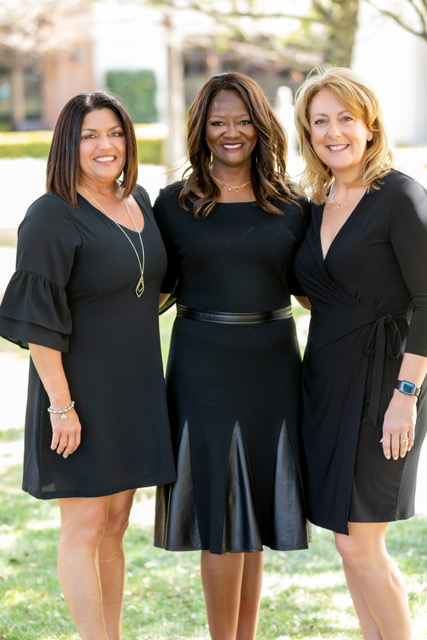
Just ahead of the International Women’s Day worldwide celebration of women’s achievements, LODGING spoke to three hospitality leaders from G6 Hospitality, which owns, operates, and franchises more than 1,400 economy lodging locations under the Motel 6 and Studio 6 brands in the United States and Canada. They included: General Counsel Ama Romaine; Chief Development Officer Tina Burnett; and Chief Financial Officer Julie Arrowsmith. The women shared their paths to their current positions, their perspectives on Social and Corporate Governance (ESG) reporting, thoughts on how the pandemic affected their leadership style, and their advice to those seeking to rise up through the ranks of hospitality.
All were first exposed to hospitality as youngsters via the restaurant route, although Arrowsmith traces her very earliest “roots” to the days when, as an 8-year-old, she trailed behind the housekeepers at a Holiday Inn where her father was the general manager.
Burnett says her husband’s relocation to Dallas was what brought her directly to G6, where she’s remained for 24 years, moving through the various franchising positions that buttressed her growth and kept her engaged while making her way to the position of chief development officer responsible for growing the brands in the United States and Canada. “I now oversee not only the development teams, but also the opening teams, renovations, and lead generation; and I’m also the liaison for our advisory council,” she describes. She says, among the rewards she’s enjoyed most has been seeing the improvement in the lives of owners—many of whom were at first immigrants.
Like Burnett, Arrowsmith has spent over two decades with G6, which hired her away from the prestigious corporate accounting firm where she handled the G6 account. She has continued to stay for many reasons, including one commonly cited by industry denizens: She’s never bored. “I couldn’t have imagined at the time that I would be here for over 25 years and become CFO, but I have absolutely loved being in hospitality. I like the people, I like being in the economy lodging niche, which meets the needs of so many people. I’ve also loved seeing our company evolve. Most of all, it’s fun; I get to work every day with smart people to solve problems.”
Romaine’s waitressing days were long behind her when she switched from practicing law at a traditional firm to take an in-house attorney position at Choice, then Hilton, where, over a decade, she rose to become vice president and senior counsel for brands before going to G6 as the general counsel and chief compliance officer. While she says some are baffled by her decision to become a lawyer at a hotel company, she finds the variety of her duties—which included the launch of the company’s first Social and Corporate Governance (ESG) report—both fascinating and fulfilling. “One role I find interesting and rewarding here at G6 is that we have really been focused on ensuring that we have a strong compliance culture as a company. As we see it, it is critically important not just that we serve guests but how we deliver our services—operating responsibly, taking care of our planet, and making sure that our hotels are safe places for everyone. We also have a very diverse leadership team committed to opening doors.”
Romaine says handling the details of G6’s first ESG report—mainly setting measurable goals without having a systematized approach to reporting—was challenging, but notes that the spirit of social responsibility already had a foothold at G6. “The council on diversity, equity, and inclusion that we formed a couple of years ago was doing a really great job of helping us think about things we need to do, opportunities we need to create to be more diverse both within our company and our ownership base.” Saying “all progress is good progress” and “even incremental steps in the right direction are important,” Romaine nonetheless recognizes that goal setting is an important part of being accountable “because what gets measured gets done.” She cites the measurable goal of implementing LED lights across the entire portfolio of G6-owned or franchised hotels as an example. “We know this is good for the planet, and, in the end, it will save money for our owners.”
Burnett comments on how franchisees, too, are falling into line with this environmentally responsible standard, saying some, like California owners, were even leading the charge. “We tried to be thoughtful when we started down this path, initially instituting the lightbulb requirement only in renovations, but we are now all moving in the same direction.”
Arrowsmith echoes Romaine’s contention that, as a company, G6 needed no prodding to get onboard with a socially responsible agenda, mentioning its culture of promoting diversity from within. “I’ve watched our progress on diversity over time. I think, as we’ve organized and put a framework around it, it has raised awareness and spurred change throughout the organization.”
Reflecting on their own trajectories to the C-suite, Arrowsmith, Romaine, and Burnett stress the importance of relationship-building and reaching out to up-and-comers to ease their path to assuming leadership roles like theirs.
Arrowsmith says having access to company leadership, even from her earliest days at the company, instilled a sense of collaboration that made it easier to do something so many women find difficult—ask for help. “As I always tell my girls, don’t be afraid to ask for help. If anything, letting people know you need and appreciate their help fosters collaboration and problem-solving. It is also the mark of a good leader,” she states. “People need to keep in mind that advancement isn’t so much about having all the answers as your willingness to ask questions and your capacity to learn,” she adds.
Burnett agrees that both asking for and offering help are key in mentoring and developing a diverse workforce. “I make sure those who work for me know it’s my job to give them what they need to step outside of what they know, that there are people ready and willing to pull them up.”
As Romaine points out, although the ability to build excellent relationships is important for leaders in nearly all industries, it is especially the case in hospitality. “Doing good work is the price of admission, but being able to build relationships across the spectrum is a huge differentiator in a relationship-driven industry such as ours. It’s always important to remember that, at heart, hospitality is a business of people serving people.”
And part of serving people, she adds, gets back to the need for those in the upper echelons of hospitality to lead and inspire others to join their ranks in order to perpetuate the best traditions of the hospitality industry. “Succession planning,” as Romaine puts it, imposes on those at the top to nurture the next generation of leaders. “It’s really incumbent upon us to identify talent, provide the training and support they need to advance, and give them opportunities to get to the next level.”
Painful—but Valuable—Lessons from the Pandemic
Julie Arrowsmith says she would be happy to forget the COVID-19 pandemic, but admits that many of its painful lessons were not lost on her and her colleagues. Some, she says, reinforced her company’s mission, what she calls its “North Star”: to leave the lights on for people. “We asked ourselves, ‘How can we stay true to our values with our team members, our franchise partners, and our suppliers?'”
She says that mission helped inform many of the company’s decisions while enduring what she considers to be the most intense period of her own career. “I had been through many large transactions and enormous projects, but I had never seen something so completely encompass every aspect of the business.” Yet, she says, “Even as we were pulling in people from all parts of the organization on calls and trying to address so many different issues, we really stayed very focused on what our mission is, which is to leave the light on for people.”
Burnett reminds that, whether taken literally or metaphorically, leaving the lights on needed to include owners as well as guests, so communication was paramount in supporting them in the wake of the crisis. “We became very open and authentic in our communications with our owners and in how we were engaging them. There were constant updates to be sure they had the latest mandates, and we pivoted to do what needed to be done, including opening over a hundred properties remotely to meet peoples’ needs, but we also chatted and joked.” Burnett hopes this less formal, more human way of interacting—as pets and children could sometimes be heard or seen during virtual meetings—is a remnant of the pandemic that will survive. “This would have been unthinkable before, but it had us all—vendors, clients, owners, team members—thinking very differently in terms of how we treat and respect each other.”
As Romaine reflects on the darkest moments of the past two years, her biggest takeaway is this: “The pandemic demonstrated what I’ve always believed: You can do well—as our CFO can verify—and do good. We did what we needed to do in order to keep the hotels open—including providing lodging for essential workers and vulnerable populations—and we did it responsibly and safely. And, although franchisees don’t generally want to be told how to run their businesses, we were able to show them how to operate in this environment; and I think it really has paid off in spades.”











